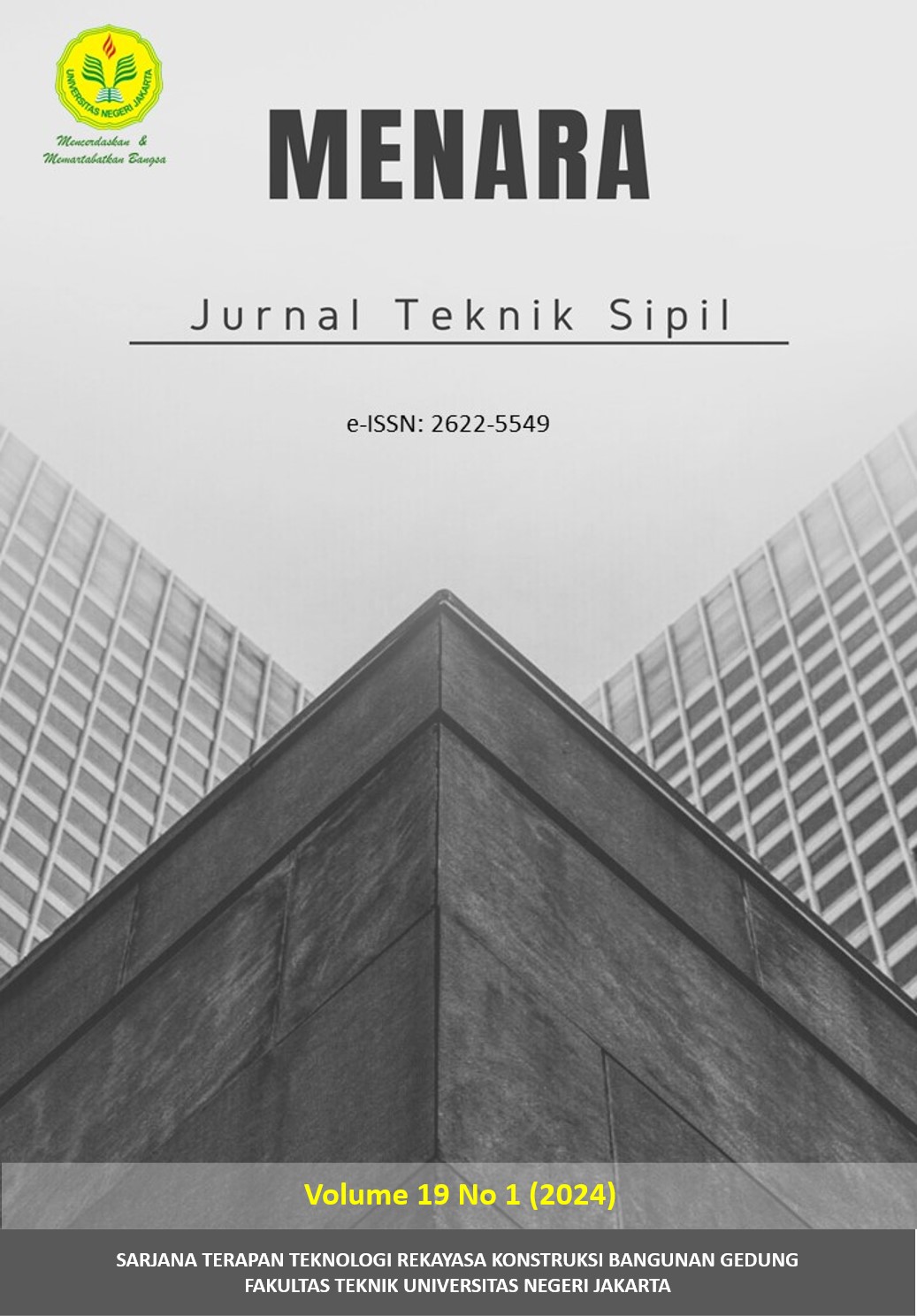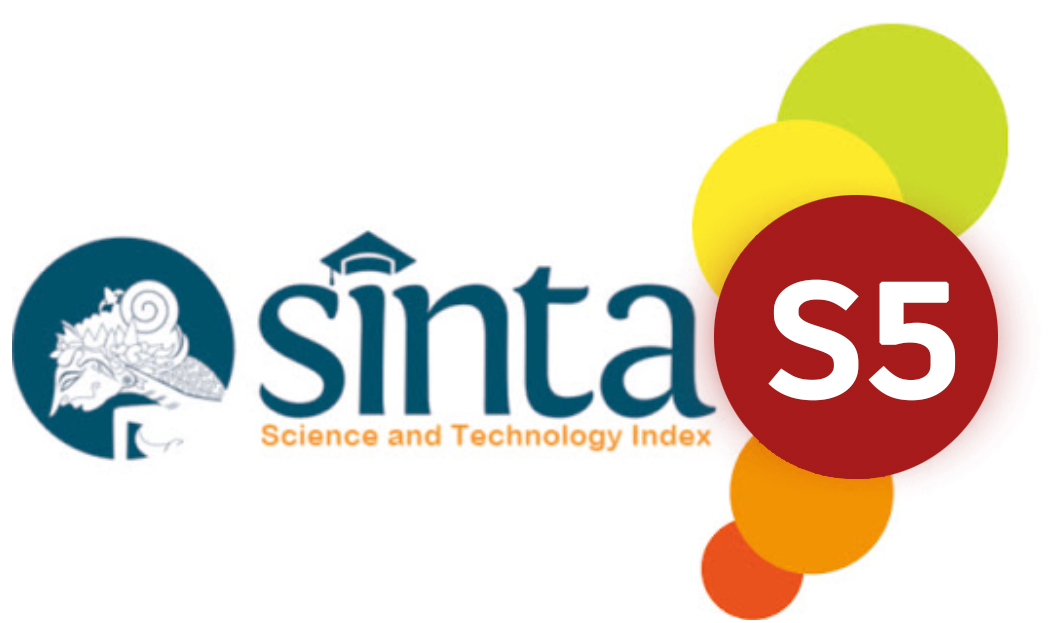OPTIMIZATION OF MAINTENANCE SYSTEMS IN SCHOOL BUILDINGS (Case Study of SMA Negeri 2 Meulaboh)
DOI:
https://doi.org/10.21009/jmenara.v19i1.41393Keywords:
Partisipasi, Pemeliharaan Rutin, Skala LikertAbstract
In an effort to maintain the condition of the school building in order to remain in good condition, it is necessary to carry out routine maintenance. The purpose of this study was to determine the level of participation of users of the SMAN 2 Meulaboh building on routine maintenance. This research uses descriptive qualitative research. Primary data collection is obtained by observation, interviews, documentation, and distributing questionnaires, while secondary data is obtained from related institutions or institutions. Data analysis was processed using the Likert Scale method. The sampling technique used is proportionate stratified random sampling. The results of the analysis obtained are 81 students (95.294%) are in the medium participation category, 4 students (4.706%) are in the high participation category, 21 teachers (70%) are in the moderate participation category, 9 teachers (30%) is in the high participation category, for 9 school staff and 1 school custodian, the results obtained are 6 respondents (60%) are in the medium participation category, 4 respondents (40%) are in the high participation category, and none of the respondents are in the low participation category.
References
Febrianti, D., & Silvia, C. S. (2019). Optimalisasi Pemeliharaan Drainase Berdasarkan Persepsi Masyarakat. Civilla: Jurnal Teknik Sipil Universitas Islam Lamongan, 4(2).
Dewi, F., & Baiquni. (2013). Pengembangan Desa Wisata Berbasis Partisipasi Masyarakat Lokal di Desa Wisata Jatiluwih. Jurnal Kawistara, 3.
Mahfud. (2015). Manajemen Pemeliharaan Bangunan Gedung Sekolah (Studi Kasus Gedung SLTA di Balikpapan). Jurnal Sains Terapan, 1(1), 7–18.
Mawardi, E., Aulia, T. B., & Abdullah. (2018). Kajian Konsep Operasional Pemeliharaan Gedung SMA Bina Generasi Bangsa Meulaboh Aceh Barat. Jurnal Teknik Sipil Universitas Syiah Kuala, 1(4), 811–822.
Mawardi, E., Samsunan, & Fathurrahman. (2020). Kajian Pemeliharaan Rutin Pada Gedung Rektorat Universitas Teuku Umar. Teras Jurnal, 10(1).
Mawardi, E., Tripoli, B., Samsunan, & Zifra, H. (2021). Optimalisasi Sistem Pemeliharaan Gedung Sekolah Berbasis Partisipasi Masyarakat (Studi Kasus: SDN 16 Meulaboh). Serambi Engineering, 4(4), 2348–2353.
Notoatmodjo, S. (2010). Metodologi Penelitian Kesehatan. Rineka Cipta.
Risnawati, K. (2021). Analisis Partisipasi Masyarakat Dalam Pemeliharaan Drainase di Kota Makale. Jurnal Plano Madani, 10(1).
Sugiyono. (2017). Metode Penelitian Kuantitatif. Kualitatif dan R&D. Alfabeta.
Widianto, F., Lenggogeni, & Rahmayanti, H. (2022). Evaluasi Pemeliharaan Dan Perawatan Bangunan Gedung K. H. Hasjim Asj’arie, Kampus A, Universitas Negeri Jakarta. Menara: Jurnal Teknik Sipil, 17(1), 35–42.
Widiasanti, I., & Nugraha, R. E. M. (2016). Kajian Pengelolaan Pemeliharaan dan Perawatan Gedung Perguruan Tinggi: Studi Kasus Universitas Negeri Jakarta. Jurnal Teknologi Rekayasa, 1(1), 41–46.
Downloads
Published
Issue
Section
License
Copyright (c) 2023 Rita Fazlina, David Setiawan, Rinaldy, Veranita, Astiah Amir, Raina Parmitalia Dinda, Zulyaden

This work is licensed under a Creative Commons Attribution-ShareAlike 4.0 International License.
Authors who publish with this Journal agree to the following terms:
- Author retain copyright and grant the journal right of first publication with the work simultaneously licensed under a creative commons attribution licensethat allow others to share the work within an acknowledgement of the work’s authorship and initial publication of this journal.
- Authors are able to enter into separate, additional contractual arrangementfor the non-exclusive distribution of the journal’s published version of the work (e.g. acknowledgement of its initial publication in this journal).
- Authors are permitted and encouraged to post their work online(e.g. in institutional repositories or on their websites) prior to and during the submission process, as it can lead to productive exchanges, as well as earlier and greater citation of published works.











